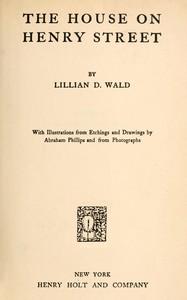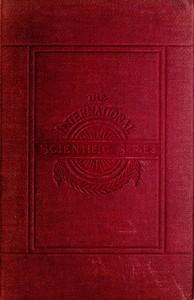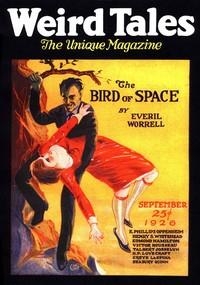|
|
Read this ebook for free! No credit card needed, absolutely nothing to pay.Words: 65373 in 25 pages
This is an ebook sharing website. You can read the uploaded ebooks for free here. No credit cards needed, nothing to pay. If you want to own a digital copy of the ebook, or want to read offline with your favorite ebook-reader, then you can choose to buy and download the ebook.

: The house on Henry Street by Wald Lillian D Tromka Abram Illustrator - Poor New York (State) New York; Henry Street Settlement (New York N.Y.)@FreeBooksThu 08 Jun, 2023 PREFACE The Bohemians of whom it is a question in this book have no connection with the Bohemians whom melodramatists have rendered synonymous with robbers and assassins. Neither are they recruited from among the dancing-bear leaders, sword swallowers, gilt watch-guard vendors, street lottery keepers and a thousand other vague and mysterious professionals whose main business is to have no business at all, and who are always ready to turn their hands to anything except good. The class of Bohemians referred to in this book are not a race of today, they have existed in all climes and ages, and can claim an illustrious descent. In ancient Greece, to go no farther back in this genealogy, there existed a celebrated Bohemian, who lived from hand to mouth round the fertile country of Ionia, eating the bread of charity, and halting in the evening to tune beside some hospitable hearth the harmonious lyre that had sung the loves of Helen and the fall of Troy. Descending the steps of time modern Bohemia finds ancestors at every artistic and literary epoch. In the Middle Ages it perpetuates the Homeric tradition with its minstrels and ballad makers, the children of the gay science, all the melodious vagabonds of Touraine, all the errant songsters who, with the beggar's wallet and the trouvere's harp slung at their backs, traversed, singing as they went, the plains of the beautiful land where the eglantine of Clemence Isaure flourished. At the transitional period between the days of chivalry and the dawn of the Renaissance, Bohemia continued to stroll along all the highways of the kingdom, and already to some extent about the streets of Paris. There is Master Pierre Gringoire, friend of the vagrants and foe to fasting. Lean and famished as a man whose very existence is one long Lent, he lounges about the town, his nose in the air like a pointer's, sniffing the odor from kitchen and cook shop. His eyes glittering with covetous gluttony cause the hams hung outside the pork butcher's to shrink by merely looking at them, whilst he jingles in imagination--alas! and not in his pockets--the ten crowns promised him by the echevins in payment of the pious and devout fare he has composed for the theater in the hall of the Palais de Justice. Beside the doleful and melancholy figure of the lover of Esmeralda, the chronicles of Bohemia can evoke a companion of less ascetic humor and more cheerful face--Master Fran?ois Villon, par excellence, is this latter, and one whose poetry, full of imagination, is no doubt on account of those presentiments which the ancients attributed to their fates, continually marked by a singular foreboding of the gallows, on which the said Villon one day nearly swung in a hempen collar for having looked too closely at the color of the king's crowns. This same Villon, who more than once outran the watch started in his pursuit, this noisy guest at the dens of the Rue Pierre Lescot, this spunger at the court of the Duke of Egypt, this Salvator Rosa of poesy, has strung together elegies the heartbreaking sentiment and truthful accents of which move the most pitiless and make them forget the ruffian, the vagabond and the debauchee, before this muse drowned in her own tears. Besides, amongst all those whose but little known work has only been familiar to men for whom French literature does not begin the day when "Malherbe came," Fran?ois Villon has had the honor of being the most pillaged, even by the big-wigs of modern Parnassus. They threw themselves upon the poor man's field and coined glory from his humble treasure. There are ballads scribbled under a penthouse at the street corner on a cold day by the Bohemian rhapsodist, stanzas improvised in the hovel in which the "belle qui fut haultmire" loosened her gilt girdle to all comers, which now-a-days metamorphosed into dainty gallantries scented with musk and amber, figure in the armorial bearing enriched album of some aristocratic Chloris. But behold the grand century of the Renaissance opens, Michaelangelo ascends the scaffolds of the Sistine Chapel and watches with anxious air young Raphael mounting the steps of the Vatican with the cartoon of the Loggie under his arm. Benvenuto Cellini is meditating his Perseus, Ghiberti is carving the Baptistery doors at the same time that Donatello is rearing his marbles on the bridges of the Arno; and whilst the city of the Medici is staking masterpieces against that of Leo X and Julius II, Titian and Paul Veronese are rendering the home of Doges illustrious. Saint Mark's competes with Saint Peter's. This fever of genius that had broken out suddenly in the Italian peninsula with epidemic violence spreads its glorious contagion throughout Europe. Art, the rival of God, strides on, the equal of kings. Charles V stoops to pick up Titian's brush, and Francis I dances attendance at the printing office where Etienne Dolet is perhaps correcting the proofs of "Pantagruel." The religious contests and political storms that marked the arrival of Medicis in France did not check the soaring flight of art. At the moment when a ball struck on the scaffold of the Fontaine des Innocents Jean Goujon who had found the Pagan chisel of Phidias, Ronsard discovered the lyre of Pindar and founded, aided by his pleiad, the great French lyric school. To this school succeeded the reaction of Malherbe and his fellows, who sought to drive from the French tongue all the exotic graces that their predecessors had tried to nationalize on Parnassus. It was a Bohemian, Mathurin Regnier, who was one of the last defenders of the bulwarks of poetry, assailed by the phalanx of rhetoricians and grammarians who declared Rabelais barbarous and Montaigne obscure. It was this same cynic, Mathurin Regnier, who, adding fresh knots to the satiric whip of Horace, exclaimed, in indignation at the manners of his day, "Honor is an old saint past praying to." It was in the transition period between the sixteenth and eighteenth centuries that appeared those two lofty geniuses, whom each of the nations amongst which they lived opposed to one another in their struggles of literary rivalry. Moliere and Shakespeare, those illustrious Bohemians, whose fate was too nearly akin. The most celebrated names of the literature of the eighteenth century are also to be found in the archives of Bohemia, which, amongst the glorious ones of this epoch, can cite Jean Jacques Rousseau and d'Alembert, the foundling of the porch of Notre Dame, and amongst the obscure, Malfil?tre and Gilbert, two overrated reputations, for the inspiration of the one was but a faint reflection of the weak lyricism of Jean Baptiste Rousseau, and the inspiration of the other but the blending of proud impotence with a hatred which had not even the excuse of initiative and sincerity, since it was only the paid instrument of party rancour. We close with this epoch this brief summary of Bohemia in different ages, a prolegomena besprinkled with illustrious names that we have purposely placed at the beginning of this work, to put the reader on his guard against any misapplication he might fall into on encountering the title of Bohemians; long bestowed upon classes from which those whose manners and language we have striven to depict hold it an honor to differ. Today, as of old, every man who enters on an artistic career, without any other means of livelihood than his art itself, will be forced to walk in the paths of Bohemia. The greater number of our contemporaries who display the noblest blazonry of art have been Bohemians, and amidst their calm and prosperous glory they often recall, perhaps with regret, the time when, climbing the verdant slope of youth, they had no other fortune in the sunshine of their twenty years than courage, which is the virtue of the young, and hope, which is the wealth of the poor. For the uneasy reader, for the timorous citizen, for all those for whom an "i" can never be too plainly dotted in definition, we repeat as an axiom: "Bohemia is a stage in artistic life; it is the preface to the Academy, the H?tel Dieu, or the Morgue." Free books android app tbrJar TBR JAR Read Free books online gutenberg More posts by @FreeBooks

: Firegod by Budrys Algis - Science fiction; Short stories; Human-alien encounters Fiction; Religion Fiction; Technology Fiction@FreeBooksThu 08 Jun, 2023
|
Terms of Use Stock Market News! © gutenberg.org.in2025 All Rights reserved.






